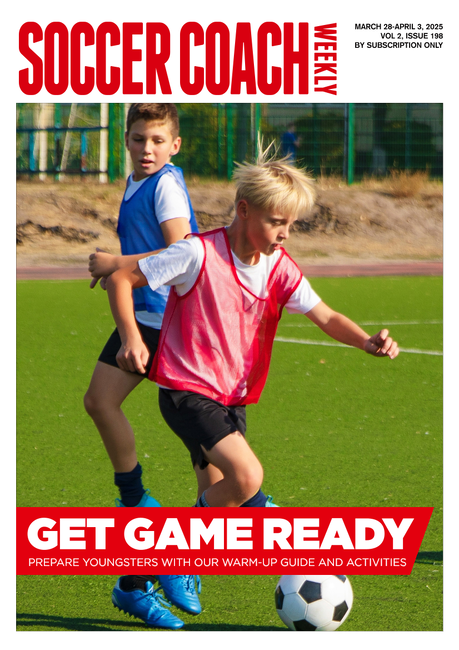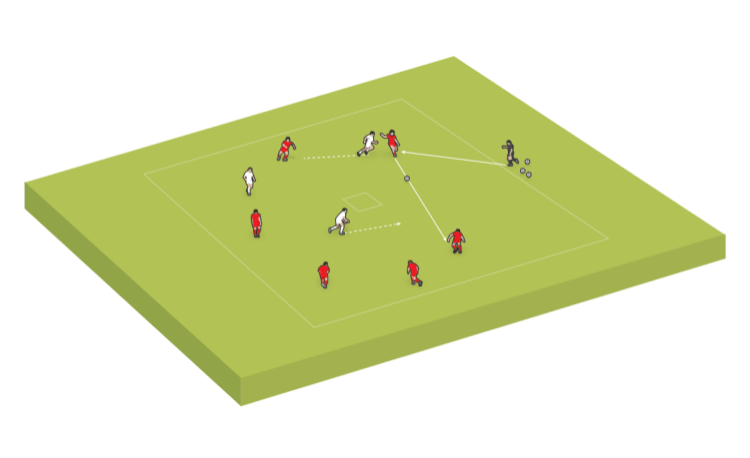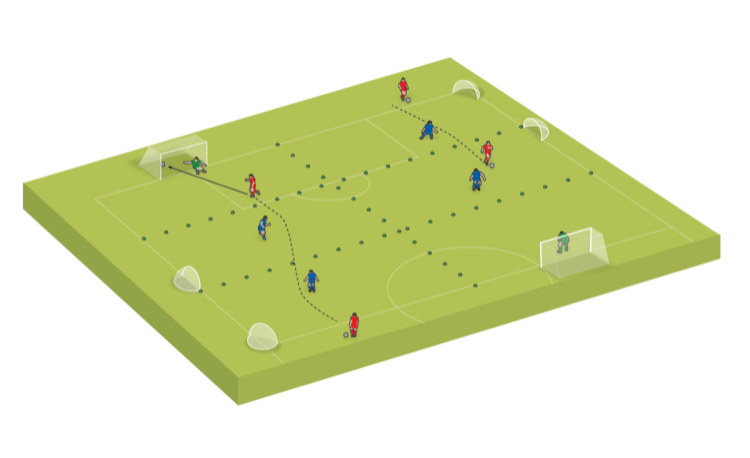10 steps for starting your own team
If you’ve ever thought of starting your own soccer team or forming your own club, try following our 10-step guide to getting it off the ground.
01 DO IT FOR THE RIGHT REASONS
The number one reason for setting up a new a new team is to give playing opportunities to children who otherwise would not play – it is the best reason and the easiest to justify. A lot of new teams are set up to cater for additional age ranges within existing clubs where guidance and help may already be available.
However, some coaches start their own teams because they can’t find a club run by someone who has the right philosophy, or because they fear their own child will become one of the players who sit on the bench every week. If you’re thinking of starting a new team, make sure it’s for the right reasons: so that children can enjoy playing football and develop both as footballers and as people.
02 MAKE SURE YOU HAVE THE TIME
If you’re going to start a new club or team and if you intend to coach or manage it yourself, you will need to appreciate the time commitment that will be required. Too often someone will take on the responsibilities for running a team without understanding the significant amount of administration involved behind the scenes.
Also, the coach of the team will have to commit to running two practices a week and clear a three hour chunk of time for a game on every Saturday or Sunday. It’s hard enough to start a new team without trying to do all the jobs yourself.
03 FIND A PITCH TO PLAY ON
Once you’ve decided to start your own team, you need to find somewhere to play. It’s rare to come across recreational facilities that aren’t already being used for either matches or training at the peak times such as weekends and in the evenings.
Conduct an inventory of all the possible places in your area that you could use to play and also check with your local authority about hiring pitches. Ask at other clubs in the area too and at local schools (both private and state run). Pitch hire costs and terms vary widely, so take note of these when making your decision.
04 GET AFFILIATED
Find out which of the leagues in your area you could become affiliated to. Contact them and find out how to become a member and enter a team. You will need to fill in forms about the club and appear at a meeting of the league’s board of directors to gain approval. You have a list of things you need to show them, like insurance, a code of conduct and a list of club officials.
Affiliation acts as a quality assurance and a safety net to help protect players, clubs, officials and administrators.
05 BE AWARE OF THE COSTS
To run a team you will need to set up a fund that each parent pays into in order to cover the costs of their child. This would include registration fees, referees’ fees, a full kit for each player, the costs of training and match day facilities, and possible fines for when you’re up and running.
A treasurer will need to set up a bank account so you have somewhere to keep the money. Work out all your costs in advance and establish the budget needed to run the team. That will help you to work out the amount of the subscription fee you will need to charge per player to run the club.
With little money to start with, you may be able to secure sponsorship for the team from a local business putting its name on the team shirts.
06 APPOINT CLUB OFFICIALS
You need to appoint club officials to look after certain areas – don’t try and do it all yourself, ask for volunteers. You will find parents are keen to help.
The main positions are: chairman, treasurer, manager, coaches, secretary, child protection officer, and first aid officer. Some positions require going on courses to learn about the role.
In the UK, anyone performing a role that involves a direct working relationship with children must face a Criminal Records Bureau check (or equivalent), to make sure the person is suitable to work with children.
07 RECRUIT ENOUGH PLAYERS
For successful player development at a club you will need to have enough players in the age group so that holidays, sickness and injury can all be covered by the size of the squad.
A great way to recruit is to run trials where people can turn up and you get to see what type of a player they are (it also let’s you see what type of a person they are too). Talk to the sports editor of your local paper to try and get them to publicise your new team.
Use social media like Facebook and Twitter and send out letters to local schools to get yourself a good number of players to turn up.
08 PICK A COACH
If you’re not coaching your new team yourself, make sure you select the coach carefully.
Write out a list of qualities you want from the coach and get them to sign an agreement that they will follow your blueprint for the team. Remember, the reason you are probably starting your own team is because the set-up was wrong at your previous club. If you left your old club because the coach wasn’t giving the squad members equal playing time, then it would be foolish to appoint someone who was going to do the same thing. The coach needs to work out a syllabus that covers all aspects of attacking and defensive play.
09 SIGN UP YOUR PLAYERS
The work of the club secretary begins immediately, with all players having to be registered before they can play for a new club.
Make sure parents know about player registration dates and deadliness, so no one misses out. Also remind parents that players usually have to bring birth certificates and two passport sized photos in order to get player cards from the league.
The club secretary must also make sure that all managers and coaches have been checked by the Criminal Records Bureau (or equivalent).
10 BE INSURED
Make sure you have all the insurance that you need to be certain that your players are cared for and your team is covered. Most leagues now require that clubs purchase liability insurance, and accident and medical insurance covering players, managers, coaches, scorekeepers and volunteer officials.
WHAT THE MANAGER SAYS
Nick Tytherleigh
Banstead Colts United U12s
Surrey, England
EIGHT years ago I took the step of forming a boy’s team. I did this because my son was being offered very little opportunity to play for the local village team. The club had two sides, along with a further four or five young lads who also wanted to play for a team. After discussion with the committee, it was agreed that I would put together another team within the club, initially to play only friendlies – although I arranged 18 in the first few months.
Although hard work, I like being involved with the team. Coming from a rugby background I conceded that I could not coach the boys myself and would have to rely on the hard work of one or two club coaches. This has worked really well and the boys have developed a great deal.
WHAT THE VOLUNTEER COACH SAYS
Meredith Rilley
Red Storm Rebels U12s
Connecticut, USA
As a mom with two young children and a part-time job, it was a daunting commitment to take on the coaching of an Under 8s team for girls. It had been a long time since I played in college and there weren’t many coaching resources online eight years ago, so I called a friend who coached and picked her brain. She taught me three drills that started me off.
The first season was an exercise in learning and patience, both for the players and for me but I grew my knowledge with online learning, as well as with coaching licensing. I’ve loved every minute of it, and as my daughters play in my teams I get to spend time with them that I otherwise wouldn’t. My former players still come up to me to say hello and tell me about their lives.
CHECKLIST
Select club name and colours
Appoint club officials
Write club constitution
Organise Annual General Meeting
Affiliate with your local association and league
Produce a list of running costs
Understand the rules of competitions you wish to enter
Familiarise yourself with Safeguarding Children rules (including under-18s or vulnerable adults)
Obtain adequate insurance
Purchase suitable kit and equipment
Hire pitches for matches and training
Raise fund and set up a club bank account
Notify members of fixtures and liaise with opposition
Newsletter Sign Up
Coaches Testimonials
Subscribe Today
Discover the simple way to become a more effective, more successful soccer coach
In a recent survey 89% of subscribers said Soccer Coach Weekly makes them more confident, 91% said Soccer Coach Weekly makes them a more effective coach and 93% said Soccer Coach Weekly makes them more inspired.
*includes 3 coaching manuals
Get Weekly Inspiration
All the latest techniques and approaches
Soccer Coach Weekly offers proven and easy to use soccer drills, coaching sessions, practice plans, small-sided games, warm-ups, training tips and advice.
We've been at the cutting edge of soccer coaching since we launched in 2007, creating resources for the grassroots youth coach, following best practice from around the world and insights from the professional game.












